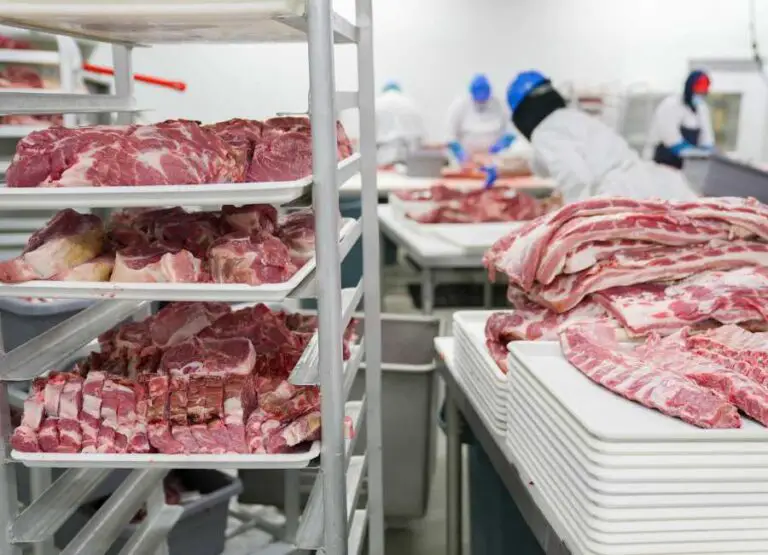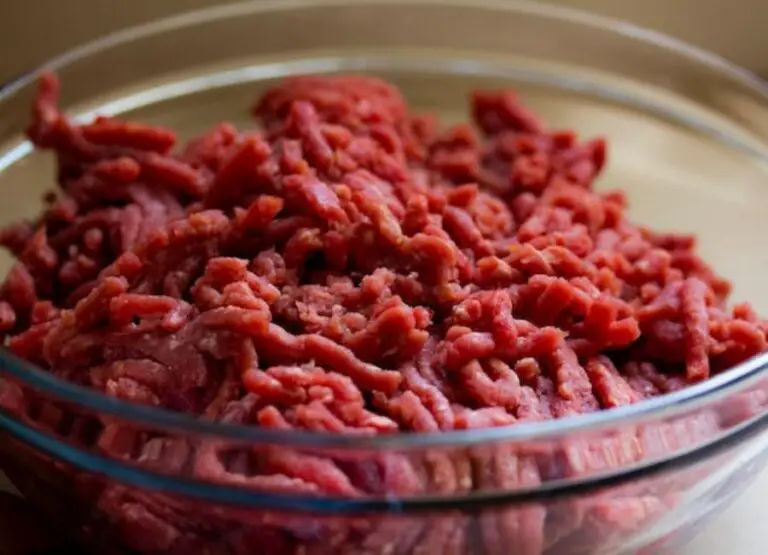Disadvantages Of Eating Sausages Regularly
Although eating sausages is a common meal option across the world, doing so on a daily basis might have some negative health effects.
In this blog article, we’ll look at some of the potential drawbacks of eating sausages, such as their high amounts of saturated fat and salt, as well as possible ties to some forms of cancer.
We’ll also look at some healthier alternatives to sausages.
You’ll know more about the possible health concerns of eating sausages at the conclusion of this article, along with advice on how to change your diet for the better.
Disadvantages Of Eating Sausages
The following are some common disadvantages of eating sausages:
High in Fat and Cholesterol
Sausages are frequently seen as unhealthy due to their high fat and cholesterol content.
Sausages are often made with fatty pork cuts high in cholesterol and saturated fat.
Because it reduces HDL cholesterol and elevates LDL cholesterol, a diet high in saturated fat and cholesterol increases the risk of heart disease and stroke (HDL cholesterol).
It may also increase your risk of developing type 2 diabetes and other health problems.
It’s important to limit your intake of sausages for these reasons and, where it’s practical, go with leaner meats like chicken or fish.
Choose lean meat cuts as an alternative, and instead turn to sources of plant-based protein like tofu and lentils.
Processed Meat Linked to Cancer
Consuming processed meats like sausages has been associated with a higher risk of developing different cancers.
According to studies, regular intake of processed meats raises the risk of stomach cancer by 38% and colorectal cancer by 18% for people who consume as little as 50g of it daily.
Although the relationship between processed meats and cancer is still not entirely understood, it is thought that when cooked.
The nitrates and nitrites present in processed meats can result in the creation of carcinogenic chemicals.
Furthermore, processed meats’ high-fat content raises the chance of developing cancer.
To reduce the risk of cancer, it is recommended to limit the consumption of processed meats, including sausages.
Instead, opt for whole, unprocessed foods, such as fruits and vegetables.
High Levels of Salt and Preservatives
The high salt and preservative content in sausages makes them potentially dangerous to consume.
Although sodium, sometimes referred to as salt, is essential for our bodies to function properly.
Consuming too much of it may lead to a variety of health issues, such as high blood pressure, strokes, and even heart disease.
Additionally, preservatives are utilized to extend the shelf life of the sausage and keep it fresh.
However, eating too many of these preservatives might be harmful because some of them are known to be carcinogenic.
Additionally, certain sausages could include added sugar, which can lead to additional health issues like obesity, diabetes, and even tooth decay.
Contains Hormones and Antibiotics
Meat from cattle that have received hormone and antibiotic treatments to enhance growth and prevent illness is frequently used to make sausages.
Consuming these hormones and medicines, though, can be harmful to human health.
Infertility, cancer, and other conditions can result from hormone disruption of the endocrine system and changes in hormone levels.
Antibiotic resistance can develop when medicines are used less effectively to treat illnesses.
Additionally, ingesting a lot of processed meats like sausages has been associated with a higher risk of several illnesses, such as type 2 diabetes, cancer, and heart disease.
Sausages May Contain Contaminants
Ground beef and a number of additional components are processed into sausages.
They could include impurities like heavy metals, herbicides, and other chemicals because the animals were exposed to them before processing, or because of the processing and preservation techniques utilized.
If taken in significant amounts over an extended period of time, these pollutants can build up in the body and result in health issues.
Damage to the neurological system, endocrine disturbance, and an increased risk of some malignancies are just a few of the possible health consequences.
Knowing where your sausages come from and eating them in moderation as part of a healthy diet are crucial.
Risk of Food Poisoning
Sausages have a higher risk of food poisoning than other processed meats because they are made from ground beef and typically contain preservatives, spices, and other ingredients that can harbor dangerous pathogens like salmonella and E. coli.
Food poisoning caused by these germs can cause symptoms including nausea, vomiting, abdominal discomfort, and diarrhea.
Additionally, because sausages are typically eaten raw or undercooked, the risk of food poisoning is enhanced.
To lessen the risk, it is suggested that sausages be properly cooked to an internal temperature of 165 °F and handled and stored carefully to prevent cross-contamination with other foods.
Contains Artificial Flavors and Colors
The consumption of sausages with artificial flavors and colors can be harmful to one’s health because they are frequently created from synthetic chemicals and can have a number of unfavorable impacts.
Sausages can be given artificial tastes and colors to enhance their visual appeal and flavor.
But these additives can also be dangerous, containing ingredients that can lead to allergies or stomach difficulties.
In addition, some artificial flavors and colors may be linked to a higher risk of developing certain cancers.
Due to these factors, it is crucial to guarantee that sausages don’t include any artificial flavors or colors by reading the ingredients list before ingesting them.
Learn more about how to freeze sausage balls.
Sausages Are High in Calories
Due to their calorie density and potential high fat and calorie content, sausages can contribute to weight gain and obesity.
Furthermore, a lot of sausages are highly processed and come with extra sugar, salt, and other additives that, when taken in big numbers, can cause weight gain.
Because sausages are high in calories, eating too many of them can increase calorie consumption, which can promote weight gain and other related health problems.
Healthy alternatives to sausages
The following are some common healthy alternatives to sausages:
- Grilled or baked chicken or turkey breast
- Plant-based sausages made from tofu, tempeh, or seitan
- Lentil or bean-based veggie burgers
- Grilled or roasted vegetables, such as portobello mushrooms or eggplant
- Seafood, such as grilled shrimp or salmon burgers
- Homemade turkey or chicken burgers with added vegetables like carrot, zucchini, or beetroot.
Frequently Asked Questions
What are the health hazards involved with eating sausages?
Saturated fat, salt, and preservatives are frequently found in abundance in sausages, and these factors can raise your risk of developing heart disease, high blood pressure, and some forms of cancer.
Can sausages upset your stomach?
Preservatives and fillers included in sausages might make some people feel bloated, gassy, and constipated.
Is it okay to consume sausages when pregnant?
It is advised that pregnant women restrict or avoid their intake of the high concentrations of nitrates and preservatives contained in sausages since they may be detrimental to a growing fetus.
Are there any dangerous compounds in sausages?
When taken in excessive quantities, some compounds found in sausages, such as sodium nitrate and sodium erythorbate, might be dangerous.
Can consuming sausages cause you to gain weight?
Yes, consistently eating sausages can cause weight gain since they are so heavy in calories and fat.
Are sausages okay for those who have food allergies to eat?
Some substances in sausages, such as dairy, soy, or gluten, may cause adverse reactions in people with food allergies.
These components may cause an allergic response if consumed.
Can sausages be harmful if they aren’t cooked properly?
Salmonella and E. coli are two dangerous bacteria that can be found in undercooked sausages and cause food poisoning.
Are sausages a healthy food source?
Many times, key elements like fiber, vitamins, and minerals are missing from sausages.
They should not be used as the primary source of food since they do not provide a balanced diet.
Conclusion
In conclusion, there may be certain risks associated with eating sausages, including their high amounts of salt and saturated fat as well as possible associations with some cancers.
Making better decisions, such as choosing leaner, less processed meat and including plant-based sources of protein in your diet, can help you avoid these negative effects.
A balanced diet may still include sausages, but it’s crucial to be aware of the possible hazards of ingesting too much of it.
Further Reading


![Why Is My Frozen Ground Beef Brown [Answered]](https://foodcreeks.com/wp-content/uploads/2023/03/Frozen-Ground-Beef-Brown-768x555.jpg)




